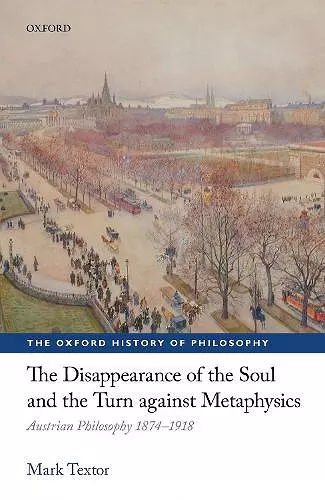The Disappearance of the Soul and the Turn against Metaphysics
Austrian Philosophy 1874-1918
Format:Hardback
Publisher:Oxford University Press
Published:17th Sep '21
Currently unavailable, and unfortunately no date known when it will be back

In the twentieth century English-language philosophy came to be science- and logic-oriented, and was suspicious of metaphysics. The Disappearance of the Soul and the Turn against Metaphysics traces our present philosophical outlook back to debates in Austro-German philosophy about the relation between empirical science and metaphysics: does empirical psychology depend on the metaphysics of the soul, the mental substance? The negative answer - that there is 'a psychology without a soul' - shaped Austrian philosophy and provided a model for ontologies that dispense with substances. Mark Textor tells the story of how and why (Austrian) philosophy turned against metaphysics . He introduces the key thinkers of the time, including the 'fathers of Austrian philosophy' Franz Brentano and Ernst Mach, whose Intentionalism (Brentano) and Neutral Monism (Mach) became distinctive and influential positions in the philosophy of mind. Textor goes on to use the 'psychology without a soul' view as a vantage point from which to reconstruct and assess the immediate pre-history and formation of analytic philosophy (Ward, Stout, Moore, Russell). While Austrian philosophers retired the soul, early analytic philosophers were happy to introduce a successor, the subject, and conceive of the mental as constituted by subject-object relations. The final part of the book returns to the theme of anti-metaphysics from a different perspective. In this part the early Moritz Schlick, who would soon become the leading figure of the Vienna Circle, takes centre stage. The final part of the book reconstructs Schlick's arguments for the conclusion that metaphysics lies beyond the limits of knowledge that are rooted in the philosophy of mind discussed in previous parts.
Mark Textor has written a fascinating book about the vanishing of a classical concept in philosophy:the soul...defnitely worth reading. * María de Paz, Metascience *
The book is easily accessible to non-specialists and also has a lot to offer to specialists. It is clearly and engagingly written. Textor writes with acuity, efficiency, and flair. He does a wonderful job presenting a large body of diverse and compli-cated material accurately and concisely. He brings a variety of thinkers into play in his study, putting the discussion on a broad footing. The book stands out for its extensive discussion of a wide range of prominent figures in the period. Textor's study is a valuable contribution to the literature and will surely succeed in stimulat-ing more discussion of this period of Austrian Philosophy. There is much to learn from this rich and informative book. It is to be recommended without reservation to every student of Austrian philosophy. * Josef Hlade, Vienna Circle Yearbook *
This is a very impressive book, indeed. It impresses with the huge variety of topics dealt within it; it impresses with the abundance of details disclosed to each of these topics; it impresses with the huge quantity of persons introduced as "players" in the overarching story. However admirably the author masters all this, it is almost unavoidable for readers to lose track of that story. The author, however, helps readers by providing valuable introductions, previews, summaries etc. Moreover, for the multitude of philosophers and psychologists mentioned in the book - many of whom are little-known even to experts — the author puts at the very beginning of the book a list of all players who appear in the course of the book. All in all, the author does an excellent job in clarifying who these players were and what they had to say. * E.Morscher, Archive für Geschichte der Philosophie *
The Disappearance of the Soul and the Turn against Metaphysics is a learned, demanding and profound book that closes a number of research gaps in the Secondary literature on 19th and 20th century philosophy. Textor manages to show that and how the following debates are connected: the controversy about self and soul in psychology, the Debate about the distinction between mental and physical phenomena, the dispute about whether judgements are one or two-termed and the argument about intuitions. [...] Textor's book will without a doubt be a mandatory reading for the next decades in history of philosophy and psychology between 1860 and 1930. * M. Kusch, Deutsche Zeitschrift für Philosophie 2023/71 *
ISBN: 9780198769828
Dimensions: 242mm x 165mm x 27mm
Weight: 720g
416 pages